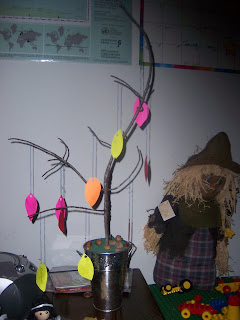Time for School
In January, we are going to begin some more formal schooling. Something more on the lines of a preschool style although still all very loose and unschooly. I decided to do this. One I need a plan or I flounder when Froggy comes looking for something to do. Froggy is clearly ready for more learning than we have been offering. Second Froggy is no longer reliably napping and we need something to do quiet in the house while the little girl I babysit for naps. So here is our plan. We are going to have a theme each week and do activities based on that theme. Our themes for January are Snow, Tu B'Shevat and Hands. We are also starting with a Nature Club which will meet once a month. I am still waffling on what do for Reading. We will probably use a combination approach mixing this and this and this . I am setting up a learning corner in our playroom. I have been wanting a reading corner by the fireplace for some time now so we are moving some stuff around to get achieve all th
